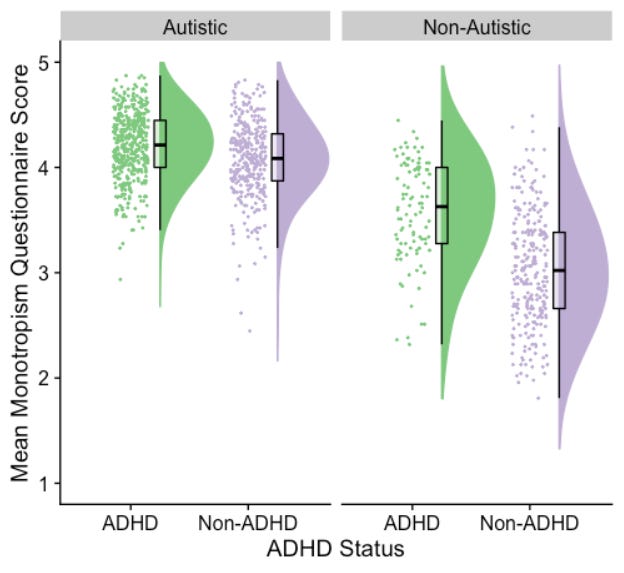Monotropism: An Emerging Attentional Concept
And a call for study participants!!!!!
Hello slugs!
I’ve been asked to share this call to participate in a research project at the University of Surrey on monotropism, ADHD, and autism, and realized I have yet to write about monotropism here at all, so let’s do a little primer.1 This is something I’ve been meaning to write about for a while —but I find myself (monotropically, lol) focused on other things.
Monotropism is a theory initially developed by autistic researchers that centers attention in explaining stuff like restricted interests, social differences, and sensory overload. Turns out, a lot of ADHDers also relate pretty hard to the idea, and in recent years, researchers have begun to investigate how it could account for their experiences, too.
In a popular 2018 essay, Fergus Murray explained it like this:
In a nutshell, monotropism is the tendency for our interests to pull us in more strongly than most people. It rests on a model of the mind as an ‘interest system’: we are all interested in many things, and our interests help direct our attention. Different interests are salient at different times. In a monotropic mind, fewer interests tend to be aroused at any time, and they attract more of our processing resources, making it harder to deal with things outside of our current attention tunnel.
The idea began with the work of Fergus’s mother, Dinah Murray, and Australian researcher Wenn Lawson, who were both exploring similar questions in the 90’s, albeit continents apart.2 When they discovered their shared research interest, they started to collaborate, and in 2005, they published a paper with Mike Lesser arguing that it is a difference in attentional allocation, not social deficits, that could best explain autism.
Taken at their DSM descriptions, autism and ADHD seem to be opposites, but I’ve always felt like there are far more similarities than differences (and personally, after researching and writing about just how much they overlap a few years ago, I gave up on parsing them out as distinctly separate aspects of my own identity).
As Fergus Murray and Sonny Hallett wrote last year, the concept could be applied to ADHD (or Kinetic Cognitive Style, an alternative term) like this:
Impulsivity could come from the monotropic tendency to lose awareness of things as soon as our attention shifts away from them. Inattention is a very familiar thing among autistic people – not an attention deficit, which was never the right term, but profound difficulty steering attention in directions which don’t align with our current interests. Hyperfocusing is common with [Kinetic Cognitive Style], as it is with autism.
Murray writes that sometimes, it may feel like we’re attending to multiple things at once,3 but that may not be what’s really going on:
I delayed getting my own autism assessment for years because I mistook my serial monotropism for polytropism: I told myself I was multi-tasking, when it would probably be more accurate to say I repeatedly forgot what I was supposed to be doing.
Honestly, too real!! The 2005 paper referred to this as “difficulties with shifting cognitive set,” noting that it is one of the strongest findings in autism research, and that:
The general problem of ‘getting stuck’, of being unable to move on without prompts, is a result of this. It seems it is only when a current interest is in play that individuals on the autism spectrum know what to do, hence the difficulties with leisure time which are so often reported in autism.
It’s not just autistic people who struggle here — this is also a really common joke in ADHD memes:
I know there’s discourse about the difference between a hyperfixation and a special interest, but I’ve never been particularly convinced that they’re distinctly separate phenomena, and the theory of monotropism seems to offer us a pretty cohesive explanation for both.
You can read a more detailed history of the concept at Monotropism.org, but TLDR, it’s gotten a lot of attention since a preprint on the Monotropism Questionnaire (or MQ) went viral on TikTok last summer. The MQ — which is still in development — was mistakenly called an autism assessment, but the researchers were quick to clarify that it is specifically meant to be a measure of monotropism, not autism.

 Tiktok failed to load.
Tiktok failed to load.Enable 3rd party cookies or use another browser
The viral MQ study found that “autism and ADHD are independently and jointly associated with higher self-report monotropism” and that AuDHDers were slightly more monotropic on average than non-ADHD autistic participants. Again: this is a pre-print (meaning it hasn’t been peer-reviewed yet), and it’s the first study of its kind, which is why it’s important that other researchers take up these questions and examine them further.

The initial study also had a few limitations to keep in mind — the sample skewed very white and highly educated, for one, and the MQ may not be all that accessible to people with higher support needs. There are also a few questions about anxiety in the MQ, which may end up being removed in the future.4 The MQ is still in its early days, but it’s exciting to see work developed by neurodivergent researchers getting funded, published, and further explored.
If you want to participate in a research project utilizing the MQ at the University of Surrey, it’s anonymous, and they’ll be gathering information until Friday.
Also: if you want to take the MQ for fun and compare your results to the chart above, someone coded it into online quiz form here. I would love to hear your thoughts on monotropism and how you relate?? Let’s discuss:
Special thanks to Richard Woods, one of the MQ’s authors, for writing to me about this study and the current state of monotropism research.
This is a weird phenomenon that has actually happened a lot in the history of science and art — it’s called ‘multiple discovery’. When an idea has its time, it makes itself known to many people at once. Elizabeth Gilbert has a wild story about this happening to her with an idea for a novel in Big Magic.
I am not super familiar with the wider literature on multi-tasking, but I have read that it’s actually just rapid task switching, not literally doing two things at once — and task switching is def a struggle for all kinds of neurodivergent ppl!
See: Woods’ YouTube video on the limitations and future possibilities for research on the MQ





Thanks for sharing! I believe I’ve come across the term monotropism before, but I forgot about it. I really identify with the concept, so it’s nice to have another term that describes my experiences. I completed the study questionnaire in less than 20 minutes. Not bad, considering that I was trying to “multitask” as I did it 😂
i feel very vindicated by this information :-)